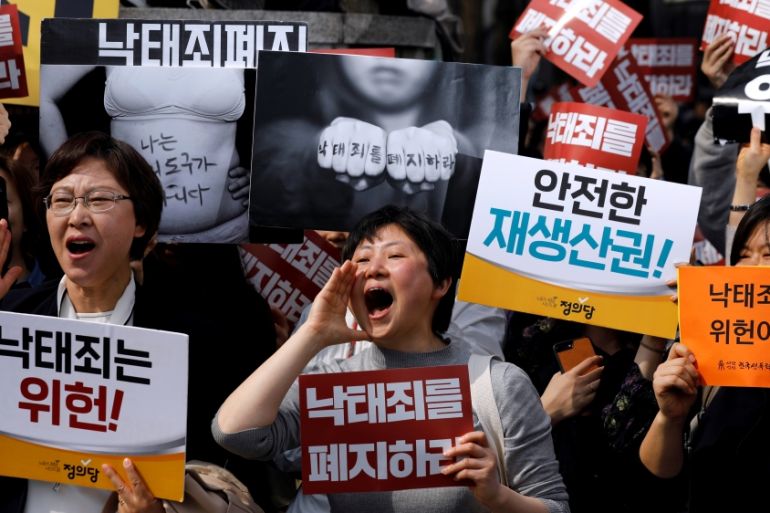South Korea’s top court orders easing of abortion ban
In landmark ruling, constitutional court orders parliament to map out new laws to replace ban in place since 1953.

South Korea‘s constitutional court has on Thursday ordered the easing of the country’s decades-long ban on abortions in a landmark ruling.
“The abortion ban limits women’s rights to pursue their own destinies, and violates their rights to health by limiting their access to safe and timely procedures,” the court said in a statement.
Keep reading
list of 4 itemsDeadly Sahel heatwave caused by ‘human-induced’ climate change: Study
Woman, seeking loan, wheels corpse into Brazilian bank
UK set to ban tobacco sales for a ‘smoke-free’ generation. Will it work?
“Embryos completely depend on the mother’s body for their survival and development, so it cannot be concluded that they are separate, independent living beings entitled to rights to life.”
|
|
Abortions have been largely illegal in South Korea since 1953, though convictions for violating the ban are rare.
Still, the illegality of abortions forces women to seek out unauthorised and often expensive surgeries to end their pregnancies, creating a social stigma.
The court’s nine-justice panel said that the parliament must map out legislation to ease the current anti-abortion regulations by the end of 2020. It said the current abortion ban will be repealed if the parliament fails to come up with new legislation by then.
An easing of the ban could open up the door to more abortions for social and economic reasons.
Current exceptions to the law only allow abortions when a woman is pregnant through rape or incest, or when a pregnancy seriously jeopardises her health, or when she or her male partner have certain diseases.
A woman in South Korea can now be punished with up to one year in prison for having an abortion, and a doctor can get up to two years in prison for performing an abortion.
Public’s reaction
Most other countries in the 36-member Organization for Economic Cooperation and Development (OECD), the so-called most developed countries, allow abortions for broad social and economic reasons.
South Korea is one of only five OECD member states that do not allow such abortions, according to the Ministry of Gender Equality and Family.
|
|
Thursday’s verdict was a response to an appeal filed in February 2017 by an obstetrician charged with carrying out about 70 unauthorised abortions from 2013-2017 at the request or approval of pregnant women.
The South Korean public has been sharply split over the abortion ban. There has been a series of heated panel discussions on television and internet programs; activists, both for and against, have for months stood with placards near the court.
About 15 pro-women’s rights activists shouted “Abolish the anti-abortion law” near the court’s entrance earlier on Thursday. More than 20 pro-life activists held placards carrying images of foetuses and messages like “Who can speak for me” and “Don’t kill me, please”.
It is not clear exactly how many abortions take place in South Korea.
In a recent survey of 10,000 women aged between 15 and 44, about 7.6 percent, or 756 respondents, said they had undergone an abortion.
They mostly cited concerns about difficulty in continuing their studies and jobs, economic problems and a desire to wait, according to the survey conducted by the state-run Korea Institute for Health and Social Affairs.